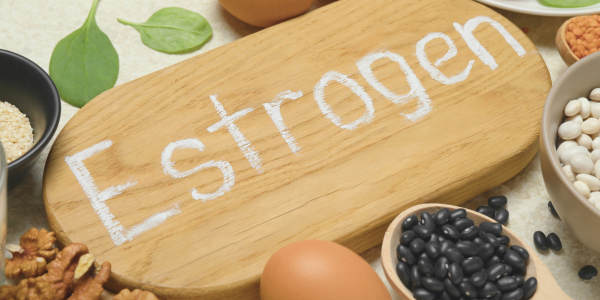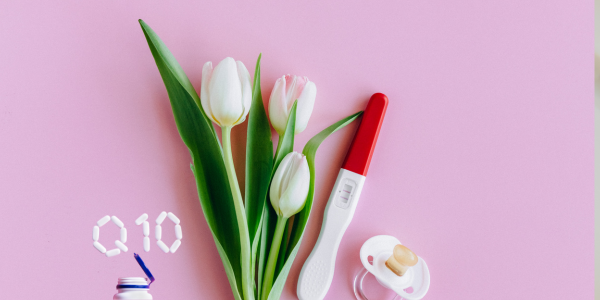The human body contains over 50 different types of hormones, acting as chemical messengers to regulate and support many bodily processes.
Oestrogen, or estrogen as it’s also spelt, is one of the main steroid hormones of the body1. Steroid hormones can be characterised as hormones produced by the adrenals, ovaries and testes. Their production, and more importantly, their balance is crucial to overall hormonal health.
Oestrogen is commonly associated as the female hormone; however, it does play key roles in both male and female health. As oestrogen typically plays a larger role in women's health, the focus will be on how to naturally increase oestrogen in females.
The Many Roles of Oestrogen in Female Health
This vital hormone helps to support:
- Fertility – including sex organ maturation, egg quality and conception
- Involved in important life stages – including puberty, menstruation, pregnancy and menopause2
- Supports the urinary tract – including the thickness and lubrication of the vaginal walls3
Oestrogen not only plays a role in hormonal health, but it also has a much wider effect on human health:
- Cardioprotective – helping to reduce the risk of cardiovascular disease (CVD).
- Bone building – helping to rebuild bone and support bone integrity, reducing common conditions like osteopenia and osteoarthritis
- Supports mood & cognitive function – Oestrogen is even neuroprotective
- Skin health – helping to support skin structure and anti-ageing4
Why Might We Want to Boost Oestrogen?
Whilst lower than normal levels of oestrogen can affect us at any life stage, a natural life stage which is impacted by oestrogen levels that gradually lower over time is menopause.
The most common (although not limited to) symptoms reported during menopause are low mood, hot flushes, fatigue & brain fog which are debilitating for many and can all be linked to low oestrogen production.
A lack of oestrogen also contributes to bone disease which increases risk during and after menopause. Many women report aches, discomfort, stiff joints and pain when they move during menopause which again can be linked to low oestrogen5.
Individuals who suffer from a testosterone-dominant hormonal condition like PCOS may also benefit from naturally increasing their oestrogen levels. Hormones work on a balancing scale and if one steroid hormone is dominant it can reduce the absorption of another.
Common symptoms of testosterone dominance in women are hirsutism, acne, mood imbalances and absent or dysregulated menstrual cycles6.
Another group of women who may benefit from increasing oestrogen levels are those who have imbalances in vaginal health. Oestrogen supports the lubrication and thickness of the vaginal walls as well as improving sexual function and arousal.
As oestrogen is cardioprotective, a female at risk of CVD may wish to increase their levels to help support and protect their cardiovascular system.
Stress Management
Chronic stress has a negative domino effect on oestrogen production, through its impact on the hypothalamic-pituitary-adrenal (HPA) axis. High cortisol, which is the body’s stress hormone, impacts the hypothalamus's ability to signal the release of hormones like luteinizing and follicle-stimulating hormone which are vital for stimulating the ovaries to produce oestrogen7.
For many, adopting simple but consistent daily stress reduction techniques can be a gamechanger for hormonal balance. Consider including any of the below tips:
- Box breathing
- Stretching
- Meditation
- Check-in with a loved one
- Take a walk in nature
- Reduce screen time before bedtime
- Engage in a social activity
Include Phytoestrogenic Foods
Foods that contain phytoestrogens don’t directly boost the body’s production of oestrogen. They do, however, bind to oestrogen receptors leading to oestrogenic effects.
Studies have shown that these foods can lead to symptoms of balanced oestrogen levels in those with low levels, including a reduction in hot flushes, improved bone health and improved cardiovascular function8.
Phytoestrogenic foods include:
- Soybeans9
- Fruits (plum, pear, apple, grape skin, berries)10
- Tofu/Tempeh
- Beans & legumes
- Green tea
- Cruciferous vegetables (broccoli, red cabbage)
Take a Probiotic
The estrobolome, a collection of bacteria in the gut, helps to metabolise oestrogen. Certain bacterial enzymes like beta-glucuronidase have a significant impact on circulating oestrogen levels, affecting how it is metabolised and reabsorbed11.
Supporting your estrobolome with a good quality probiotic can help your gut to produce, metabolise, use and excrete oestrogen effectively – improving oestrogen levels.
Our Biotic Complex contains 21 billion CFU from 15 different beneficial strains to help boost gut function and support hormonal balance.
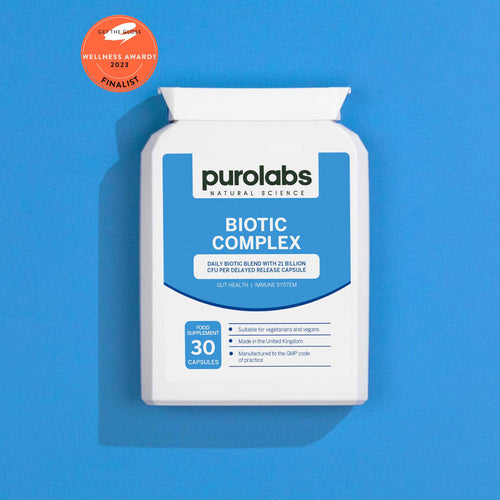
Biotic Complex
Aim for 7-9 Hours Sleep
Our circadian hormones (cortisol and melatonin) have a knock-on effect on steroid hormone production. Improving sleep quality and duration can profoundly impact oestrogen levels and balance.
- Tips to improve sleep quality:
- Adopt a regular bedtime routine
- Keep the room cool and dark
- Reduce blue light exposure an hour before sleep
- Read or use a sleep app to relax
Consider Supplementation
Nutrient deficiencies can be linked to hormonal imbalance. A vegan multivitamin can top up key vitamins like zinc, vitamin A, vitamin D & folic acid.
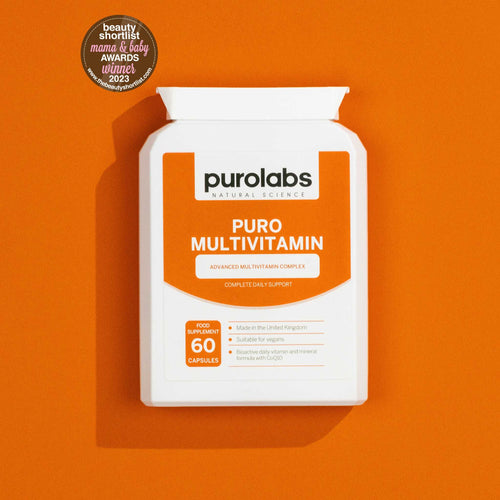
Multivitamin
The liver plays a key role in producing and breaking down oestrogen. Our Milk Thistle supplement contains a high-strength 40:1 extract (1000mg raw milk thistle equivalent per capsule), supporting liver and hormone balance12.
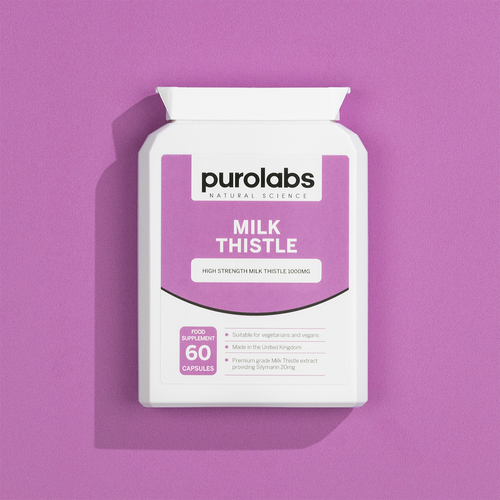
Milk Thistle
Our Meno Complex contains botanicals and nutrients to help naturally boost oestrogen levels. It can be taken with or without HRT, making it ideal for menopause or anyone with low oestrogen levels.
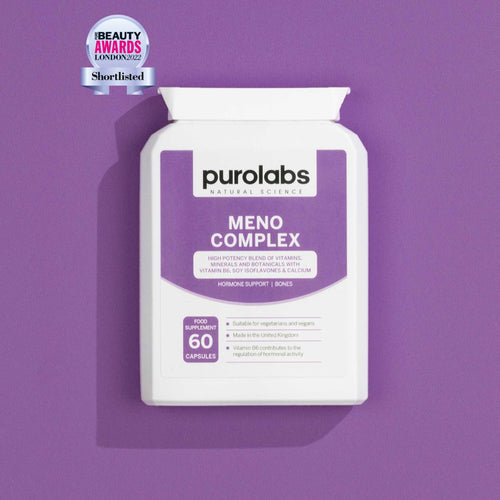
Menopause Complex
Daily Bowel Movements
Regular bowel movements are crucial for eliminating excess hormones. Constipation is directly linked to hormonal imbalance, so here are some tips:
- Consider magnesium citrate supplementation
- Drink two litres of water daily
- Add bitter foods (cruciferous veg, dandelion, turmeric, Jerusalem artichoke)
- Eat a colourful wholefoods diet rich in fibre
Hormonal Testing
If you suspect low oestrogen levels, testing can be a useful next step to uncover underlying drivers such as high testosterone or perimenopause. Your GP can offer hormonal testing, and private options are also available.

 Beauty
Beauty
 Bone Health
Bone Health
 Brain Health
Brain Health
 Energy
Energy
 Eye Health
Eye Health
 Gut Health
Gut Health
 Hair
Hair
 Hormonal Health
Hormonal Health
 Heart Health
Heart Health
 Immunity
Immunity
 Joints
Joints
 Menopause
Menopause
 Pregnancy
Pregnancy
 Kids
Kids
 Sleep
Sleep
 Stress & Mood
Stress & Mood















